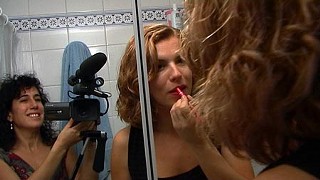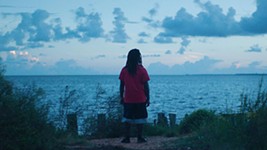The Secret Lives of Girls
AFS Documentary Tour presents 'Flying: Confessions of a Free Woman'
By Anne S. Lewis, Fri., April 4, 2008

Much to her surprise and consternation, filmmaker Jennifer Fox discovered that she'd run aground, at age 42, on the shoals of the very same modern female predicament she'd spent her entire life trying to paddle around. Growing up one of five siblings in a traditional home where Dad, an amateur pilot, soared untethered and self-actualized, while Mom kept the hearth fires burning in tedious domesticity, Fox set her cap for the open-option life of the boys. For a girl, that meant steering clear of the conventional traps of marriage or kids. So there she was, seemingly the poster girl of the feminist ideal: an attractive, independent, successful doc-maker (1999's An American Love Story, 1987's Beirut: The Last Home Movie), living in her spacious Tribeca apartment with her large dog, breezily traversing the world and some of its most dangerous locales –solo – for work and pleasure. She had an enviable network of smart, caring girlfriends both at home and in far-flung places –and simultaneously juggled relationships with a married South African lover (with whom she was crazy in love) and a persistent Swiss boyfriend, each of whom (the wife excepted) knew about and tolerated the other. In short, she was Carrie, Miranda, and Samantha rolled into one – and content as a hat-tossing Mary Tyler Moore. Except for this nagging feeling of invisibility, which became more insistent as she entered her 40s, making her wonder whether she really needed to be married and have a family –even if she didn't want to.
Alas, real life (and hints of mortality) moved things along when a close friend was diagnosed with a brain tumor. Then Fox accidentally became pregnant (the Swiss boyfriend) and, to her surprise, discovered her inner Charlotte. (No wonder Sex and the City creator Candace Bushnell loved this film.) While her first response to the possibility of motherhood was panic – "What about my work?" – she had a different reaction when she subsequently miscarried: "Suddenly it was over, the decision taken out of my hands, and my life returned to what it was before. Except now I didn't want it to. Now I thought I wanted a child – but with which man?" Fox resolved to get to the bottom of her ambivalence about how to be female in this life.
She did this by turning on her small hand-held camera for the next four years, filming and narrating, in her innocent little-girlish voice and speaking-style, the soap opera of her life, in which she balanced two boyfriends and the inchoate, hovering cloud of the procreation option. To help her figure out how to balance sexual freedom, love, and motherhood, Fox packed her bags and traveled to 17 countries, inviting women friends, family, and acquaintances –from London and Soweto (in Johannesburg, South Africa) to Kolkata, India, and Phnom Penh, Cambodia –to engage with her in frank, unexpurgated "girl talk" about their lives. What she learned during the course of this six-part miniseries (which will screen over the course of three nights) is that women have, universally, been forced to accommodate, and often deny, their own needs and desires depending upon the unique constellation of personal, sexual, and cultural constraints that each faces. The Somali women fighting against their country's tradition of female genital mutilation; the Indian women who became prostitutes when they were rendered unfit for marriage because they had been raped or simply had premarital sex; Fox explaining what masturbation is to an incredulous, giggling group of clueless professional Indian women.
Nothing new there, at least to the feminists in the viewing audience, and yet we're riveted – perhaps by Fox's mesmerizing guilelessness and transparency? –as we eavesdrop on these uninhibited conversations that Fox facilitates using a technique she calls "passing the camera," in which, like a talking stick, the camera is passed back and forth between those conversing.
Austin Chronicle: You've said that you're not political and have never called yourself a feminist, and yet your film certainly seems to make a feminist point. What effect did making the film have on you?
Jennifer Fox: I think the film politicized me –made me very political. It changed me, made me see that gender is such a big issue. When I started, I didn't understand that –I was confused about my own gender identification, and so the journey was to try and make sense of who I was as a woman. Along the way, I saw that my experience was universal.
AC: I'm fascinated by how you managed to film yourself without playing to the camera.
JF: That was the biggest challenge – getting to the point where I could be real with the camera.
AC: How did you do it? All those close-ups of you in taxis, on planes, walking down the street, and those decisive-moment scenes of you reacting to some really emotional, pivotal event –all the while holding the camera on yourself.
JF: I had a set of rules. I knew if I started performing, there wouldn't be a film. So I shot all the time to diminish the importance of the camera –you get to the point where you're thinking, "I'll never use this anyway, so what does it matter?" Also, I never used a tripod, so I didn't think so much about the perfect frame –I just threw the camera around, got used to it being part of my life. Also, I used no radio mics, so again, not a lot of fiddle, only the camera mic.
Another rule was no make-up for the camera, only if I was going to something I'd ordinarily make myself up for –no getting prepared for the camera –and then filming all the time at my worst moments, even if I looked shitty. So the whole effort was to get so used to the camera that if something difficult would happen, I would already be used to bringing the camera into every moment. Also, remember that I was in a crisis and with a very strong need to see myself. So that and the need for reflection were so great that they were stronger than any self-consciousness. And it worked.
Another thing was that there was no one else observing me, so I didn't have to think about how was I looking for that person today. It was just me and my little camera.
AC: You come across in the film as someone of such impeccable integrity and honesty that you would never think of not disclosing, upfront, to your new Swiss boyfriend, Patrick, your existing relationship with the married South African, Kye. But then you see no disconnect in going to great lengths to conceal your affair from Kye's wife – until your friends pile up on you about the pain and hurt your affair will obviously cause his wife and kids. You seemed uncharacteristically insensitive to this. What was that all about?
JF: You're looking at a person who didn't identify herself as a "woman," and then somehow in the making of this film, something shifted for me. Here I had a married lover –without any thought of his wife or his kids! That's the truth. It sounds horrible – it probably is horrible – but it's true. But during the process of making the film and the relationship, I became aware that I was hurting his wife and kids, and my allegiance shifted from men to women in the film, and also from my father to my mother. So it was only in the third hour of the film, where I say to my friend, "Oh my God, what have I done?"; that was the beginning of the pivotal realization:"What were you thinking? That you could have this affair and not hurt anybody?"
The AFS Documentary Tour presents the six-hour Flying: Confessions of a Free Woman over three nights. Parts 1 and 2 screen Monday, April 7, at 7:30pm on the UT campus at CMB Studio 4-D (located at Guadalupe and Dean Keeton); parts 3 and 4 screen Tuesday, April 8, at 7pm at the Austin Studios Screening Room (1901 E. 51st); parts 5 and 6 screen Wednesday, April 9, at 7pm at the Alamo Drafthouse at the Ritz (310 E. Sixth). Monday night's screening is free and open to the public; admission to the second and third nights' screenings costs $4 for AFS members and $6 for the general public. Jennifer Fox will be in attendance for a Q&A at all screenings. For more information or to purchase tickets, visit www.austinfilm.org.










